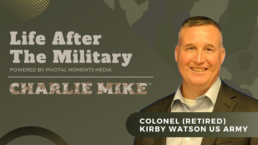Life After The Military: Colonel (Retired) Kirby Watson
Do you want to learn the lessons of what to do and what not to do IOT to have a low stress and highly successful transition from the military to the public or private sector?
Did you say “YES?

Then check out the newest Pivotal Moments Media, Life After The Military podcast with Army Colonel (Retired) Kirby Watson!
Kirby is one of the finest, most authentic, and genuinely caring leaders that our co-host, Howie Cohen, EVER served with during his 27+ year military career!
Kirby spent 33 years as an Army Signal Officer and candidly discusses everything he did right and wrong
- what he did wrong while transitioning – overscheduling interviews, not focusing on one area of need, not properly informing colleagues of the transition
- what he got right – focusing on finding a good team, taking advantage of the TAP program, being honest about his health state, sourcing colleagues and job applications and honest company reviews through his LinkedIn network, carefully preparing for interviews
- Discusses how he transitioned out as a veteran by taking the initiative to seek out mentors and carefully going through each step leading up to the job search process
Howie, Lee and Kirby implore listeners to
- Be honest about medical needs during the transition
- Put yourself and your needs (and the needs of your family) first
- Connect with colleagues on LinkedIn and extensively research positions
- Focus on team building rather than resume building
Kirby also shares advice and guidance for veterans looking to enter the government contracting space and what mental fitness means to him
Show Notes:
00:00 Lee introduces Kirby Watson, a decorated 33-year Army veteran
3:08 After 33 years, Kirby discusses what he did to prepare to transition – focusing on the TAP programs and educational opportunities available at the Pentagon
6:44 Kirby gets specific about what he did wrong while transitioning – overscheduling interviews, not focusing on one area of need, not properly informing colleagues of the transition
10:46 Howie relays an important point, that transitions are just as important for long-time servicemembers once they believe their military career has ended
14:09 The discussion shifts to the need for servicemembers to sometimes put themselves first – a difficult task for those who are trained to serve others
17:48 Kirby discusses what he got right – focusing on finding a good team, taking advantage of the TAP program, being honest about his health state, sourcing colleagues and job applications and honest company reviews through his LinkedIn network
22:48 The group recaps Kirby’s most important steps during the transition – owning the process, taking advantage of LinkedIn, starting as early as possible
27:45 Kirby tees up his final important steps during transitioning: careful preparation for interviews
32:40 Howie shares parallels between Kirby’s story and his own, imploring listeners to speak up for themselves and their health during their transition
37:28 Kirby shares advice and guidance for veterans looking to enter the government contracting space: ask questions and seek to understanding the language of the place you’re at, find a good team and constantly expand it
45:03 Lee relates to Kirby’s lessons on the extreme importance of networking/network-building
48:00 Howie implores veterans transitioning to learn about basic business principles for for-profit companies, noting the difference in the employment model of the military
52:18 The discussion shifts to business acumen over time
54:36 Lee gives Kirby his created book title
56:40 Kirby answers the question, “what does mental fitness mean to you?” – surrounding yourself with good people, maintaining a sense of camaraderie, and being careful about what defines you
1:07:13 Lee and Howie close the show, “never verbalize a negative thought”



